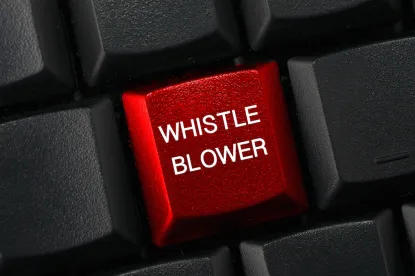This week, in a 3-2 vote, the U.S. Securities and Exchange Commission (“SEC” or the “Commission”) approved significant changes to the rules governing its whistleblower program. The program, established by the Dodd-Frank Act in 2011, incentivizes those with information about possible securities law violations to report to the SEC. If the tipster provides “high-quality original information” that leads to an enforcement action where monetary sanctions exceed $1 million, the SEC will award a bounty equal to 10 to 30 percent of the sanctions. According to the SEC, whistleblower reports have already led to enforcement actions ordering over $2.5 billion in financial remedies and resulting in more than $500 million in whistleblower awards.
Perhaps the most significant of this week’s rule changes is new Rule 21F-6(c), which creates a presumption for the statutory maximum whistleblower award amount (i.e., 30 percent of the monetary sanctions ordered) in most cases. Under this new rule, if the maximum award that the whistleblower could receive is $5 million or less, then the whistleblower will presumptively receive that amount. The SEC can depart from that presumption based on negative factors enumerated in Rule 21F-6(b) – including culpability on the whistleblower’s part, unreasonable reporting delay, and interference with internal compliance and reporting systems – but the new rule is clearly intended to result in the maximum award in the majority of cases. For awards over $5 million, the Commission will continue to apply its well-established factors for award determinations, discussed more fully below.
The SEC also approved clarifying changes regarding its discretion to determine and award the bounties in percentage or dollar terms, using the Rule 21F-6 factors. These include the negative factors specified in Rule 21F-6(b), as well as several positive factors that may increase the award amount, including the significance of information provided, the degree of assistance, and the Commission’s programmatic interests. See Rule 21F-6(a). As Chairman Jay Clayton explained, it was “evident during the rulemaking process [that] there was public confusion about the Commission’s discretion in applying those factors.” In an effort to address that confusion, the SEC’s new rules explicitly affirm the SEC’s “broad discretion” to use the factors to set the award amount in percentage terms, dollar terms, or some combination thereof.
Some, including dissenting Commissioners Allison Lee and Caroline Crenshaw, have criticized this clarification. Commissioner Lee worried that this discretion would allow the SEC to limit or cap an award, simply because it is deemed to be “too large,” even when the Rule 21F-6 factors dictate a high percentage. Both she and Commissioner Crenshaw expressed “serious concerns” that the revised rule could lead to different award percentages simply based on the size of the sanction. In her dissenting remarks, Commissioner Lee also warned that the rule created a lack of transparency and accountability for whistleblower award decisions.
In his own remarks, Chairman Clayton sought to ease such concerns. He noted that the rule change makes clear that award determinations are to be based exclusively on the application of the factors enumerated in Rule 21F-6 and that it does not grant the SEC discretion to change an award based on a separate, after-the-fact assessment that it is “too small” or “too large.” It seems likely, however, that the discretion to set awards in either dollar or percentage terms may result in lower percentage awards in at least some high dollar cases.
Although the 3-2 vote reflects Commission disagreement over the specific rule changes, SEC officials affirmed the SEC’s commitment to the success of the whistleblower program throughout the rulemaking process. These changes are unlikely to diminish the overall effectiveness of the program or the powerful incentive that these awards provide. In fact, on Monday of this week, the SEC awarded another whistleblower $2.4 million, bringing the total amount paid to whistleblowers to $523 million since 2012. There is no doubt that the agency remains committed to rewarding tipsters who provide it with high-quality original information that leads to an SEC win.





 />i
/>i
